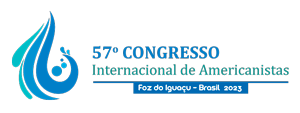| Dados do autor | |
|---|---|
| Sua instituição | The University of Southern Mississilli |
| País de origem do autor | Estados Unidos |
| Dados co-autor(es) [Máximo de 2 co-autores] | |
| Sua titulação | Doctor |
| Proposta de Paper | |
| Área Temática | 09. Estudos Culturais |
| Grupo Temático | Cuerpo y alimento en el ritual: miradas comparativas entre Mesoamérica y el Área Andina |
| Título | On Superfoods and Herbal Cures: Healing Remedies and their Patron Divinities in Colonial Mexico |
| Resumo | In the Nahuatl invocations and rituals described in the Tratado de Supersticiones (1629), healers employed comestibles as part of their therapies, while also invoking divinities who embodied the active principles of the substances consumed. This study analyzes the curative properties of the remedies, including pulque, maíz and piciete (tobacco). Other important cures mentioned in the invocations include, yauhtli and cempoxichitl (Tagetes lucida “Mexican mint marigold” and Tagetes var.), tzopillotl (Cyberus odoratus) and tlacopatli (Aristolochia var. “pelican flower”). For some situations, healers employed exotic preparations made from the ground bodies of insects or arachnids, like axin (Llaveia axinus) and scorpions, as well as psychotropic plants like peyote and several Datura species: “ololiuhqui,” “toloache,” and “atlinan.” The invocations commemorated in this document represent the native healers’ requests for blessing or assistance from the divine entities whose realm of influence includes the healing substances. The properties of cures and their effects on the healing of specific maladies is also often reflected in or connected to the characteristics of the divinity invoked. Entities commonly invoked include Xochiquetzal and her sisters Citlalicue and Chalchihuitlicue, Ce Mallinali, and Quetzalcoatl, among others. The healers frequently call on the divinities using kinship terms including father, mother, and siblings, supporting the healers' right or permission to use these powerful agents. Occasionally, the healer will even embody the divinity to interrogate or chastise the cause of the malady or to sooth the object of a hunt while performing the prescribed ritual. |
| Palavras-chave | |
| Palavras-chave |
|
